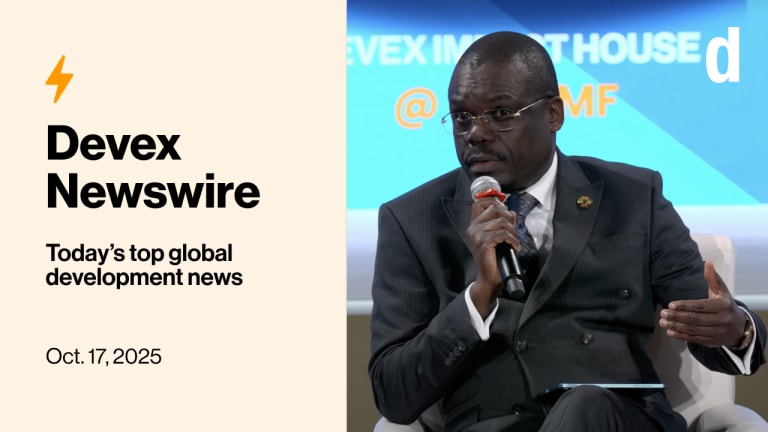
The rapid onset of the mobile phone revolution came as something of a surprise to the global development community. Now, programs that rely on mobile phones for empowering community health workers, delivering education, or tackling corruption are ubiquitous. And mobile phones themselves are everywhere — there are more mobile devices than people in the world today.
What’s the next revolution that’s coming? And how can our community get ahead of it in order to make the most of it?
One of the biggest trends we see at Devex is the rapid change happening in financial inclusion. Today, there are around 2 billion people currently living without access to financial services. If that massive unbanked population can quickly gain access to the formal financial system — of course through their mobile devices — it will spark a revolution that could ripple through the global development community. Nearly every global development and humanitarian intervention would then have the ability to use cash transfers and innovative financial instruments to deliver and measure their programs.
“Take insurance, a very simple premise. We have a cow, or a house, or a crop and that gets devastated, there is insurance that will cover for that, but how do we think about getting these people who are far from way kind of bank, access to those services?”
— Stephen Kehoe, global head of financial inclusion, VisaAmong the most important harbingers of this coming revolution is Tala, a startup social enterprise that has already provided microloans to nearly 5 million people in Kenya, Tanzania, Philippines, and Mexico with a value of $250 million. It’s done this by developing an alternate credit score that uses thousands of data-points from a borrower’s mobile phone, including their social media activity and how they store their contacts.
“Our mission is to provide customers with choice and control over their financial lives,” Tala’s founder and chief executive officer Shivani Siroya told Devex in a 2016 interview. “From day one, Tala’s mission has been to change global financial systems so that people have more access, choice, and control,” said the former United Nations Population Fund analyst who founded Tala when she was 24 and raised $30 million in her last funding round.
Uber’s former head of data science recently joined Tala as chief data officer, a move that gives a sense of the startup’s ambitions.
Siroya will be among the featured speakers at Devex World on June 12 in Washington, D.C., where the revolution in financial inclusion will be one of several major future-facing issues leaders and practitioners will consider. The global development industry event, Devex’s flagship conference held every two years, is backed by partners including Cargill, Pfizer, Premise, Johnson & Johnson, RTI, The QED Group, Oxfam, ExxonMobil Foundation, Chemonics, and Tableau.
Others who are radically reshaping the way global development will be done and will also be a part of Devex World include WeWork co-founder Miguel McKelvey, Premise CEO Maury Blackman, IDinsight CEO Neil Buddy Shah, and the Surgo Foundation’s Malcolm Gladwell, Mala Gaonkar, and Sema Sgaier.
Previously speaking to Devex, Stephen Kehoe, Visa’s global head of financial inclusion, pointed out: “Take insurance, a very simple premise. We have a cow, or a house, or a crop and that gets devastated, there is insurance that will cover for that but how do we think about getting these people who are far from way kind of bank, access to those services?”
In a world where those distances may no longer matter, where connectivity, blockchain, and AI-driven systems could bridge those geographical gaps in a matter of a few years, global development projects themselves could start to look very different.
Devex World is on June 12, 2018 at the Mead Center for the American Theater in Washington, D.C. Learn more here and note that this unique event will reach full capacity.






